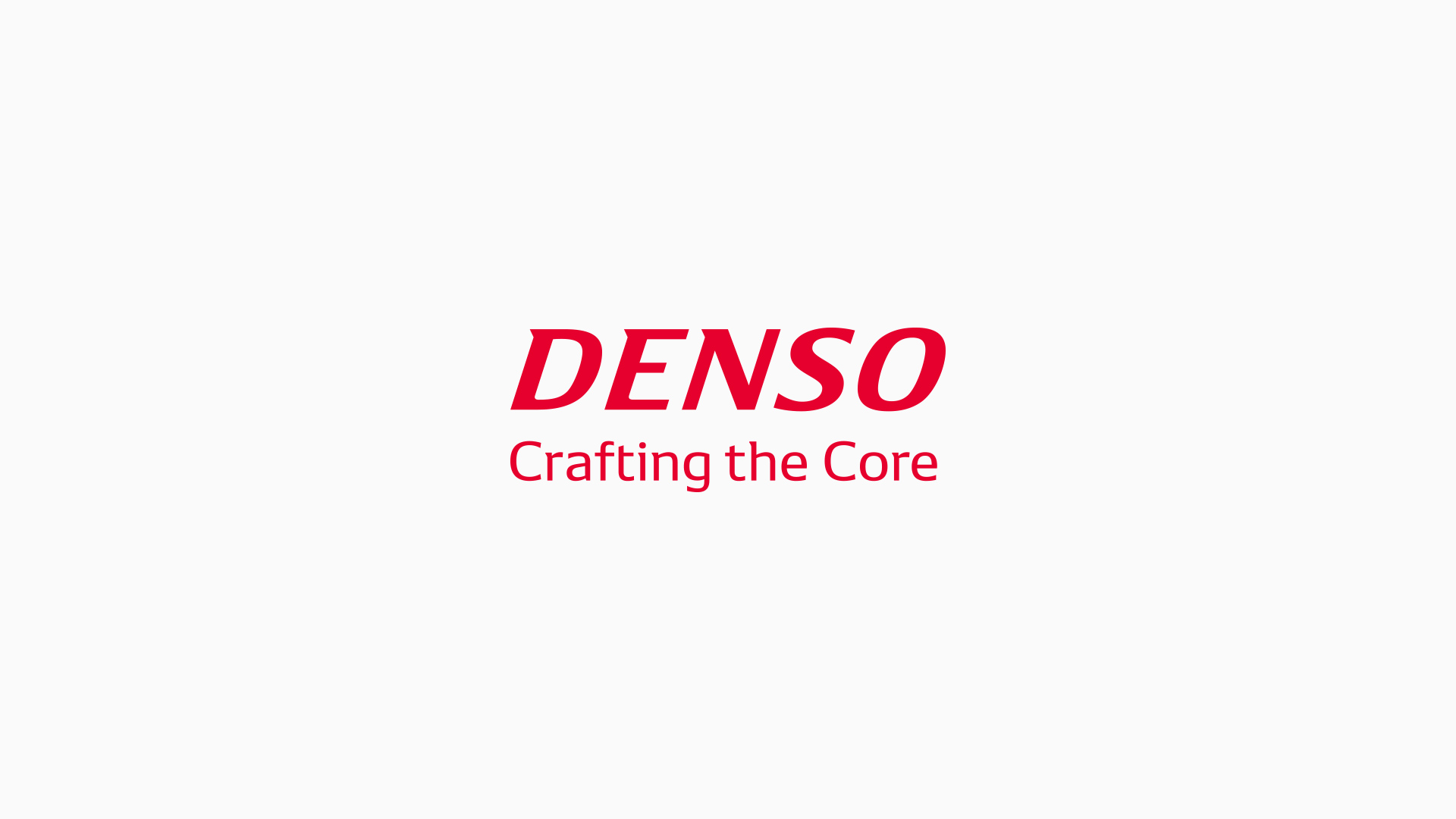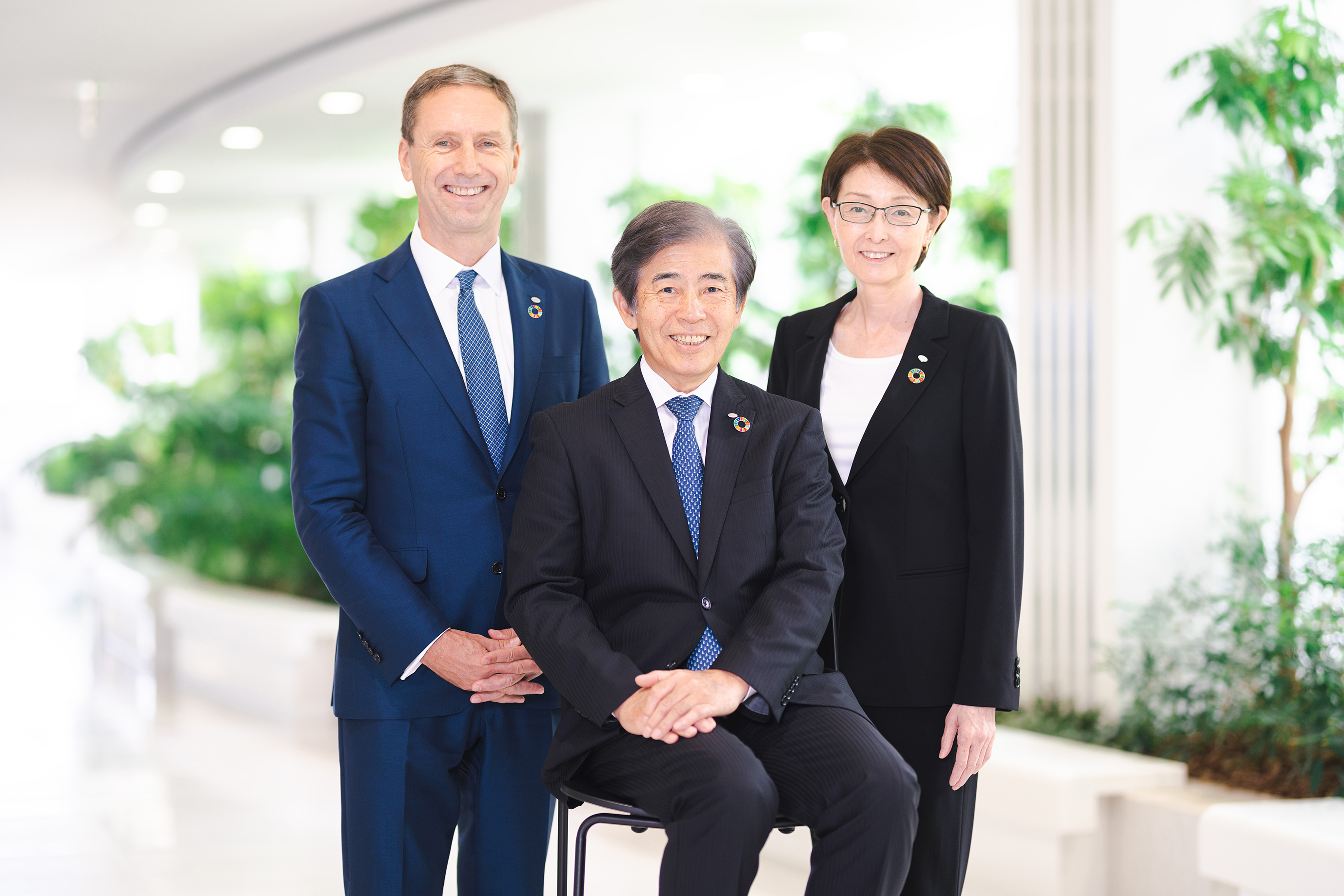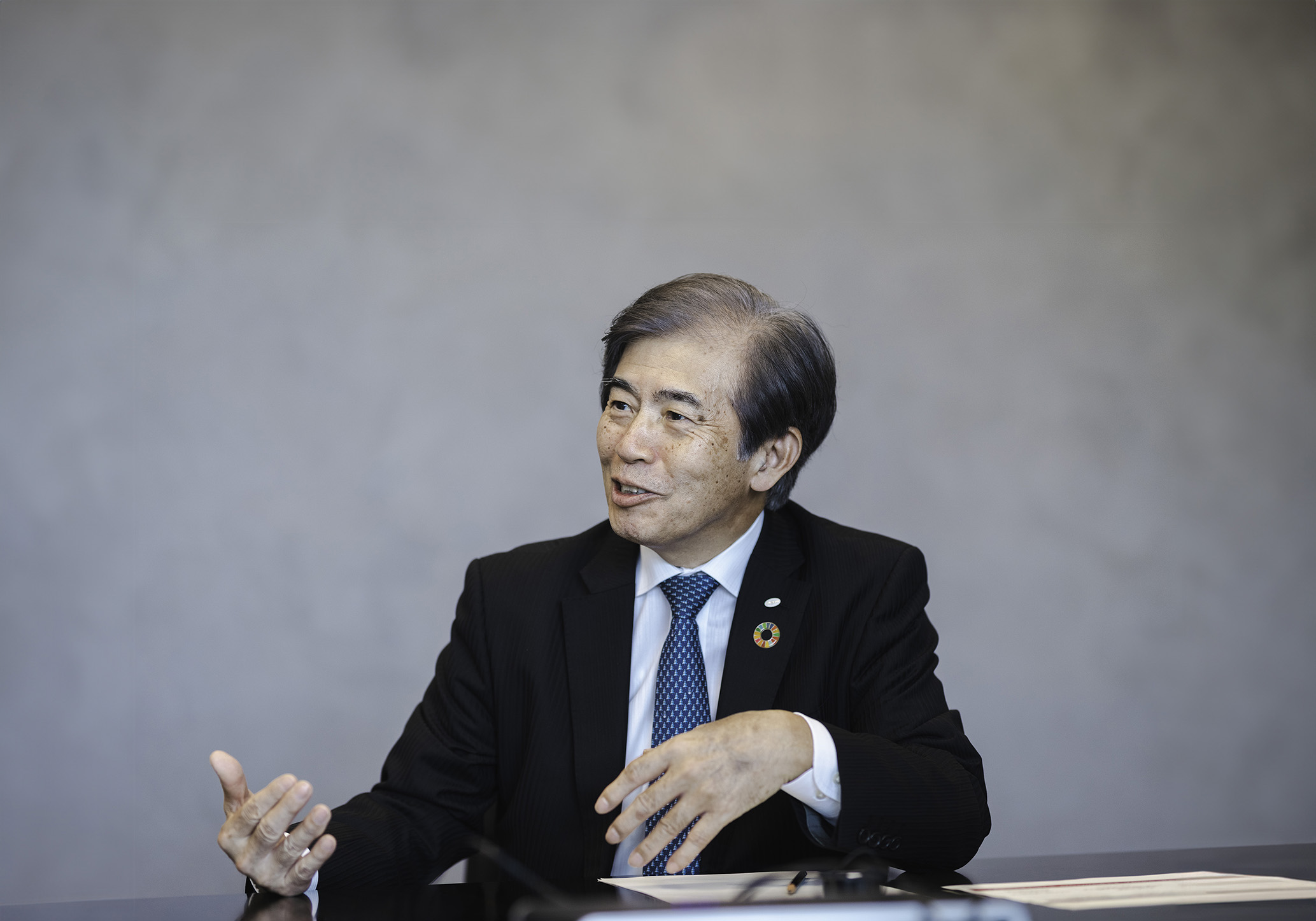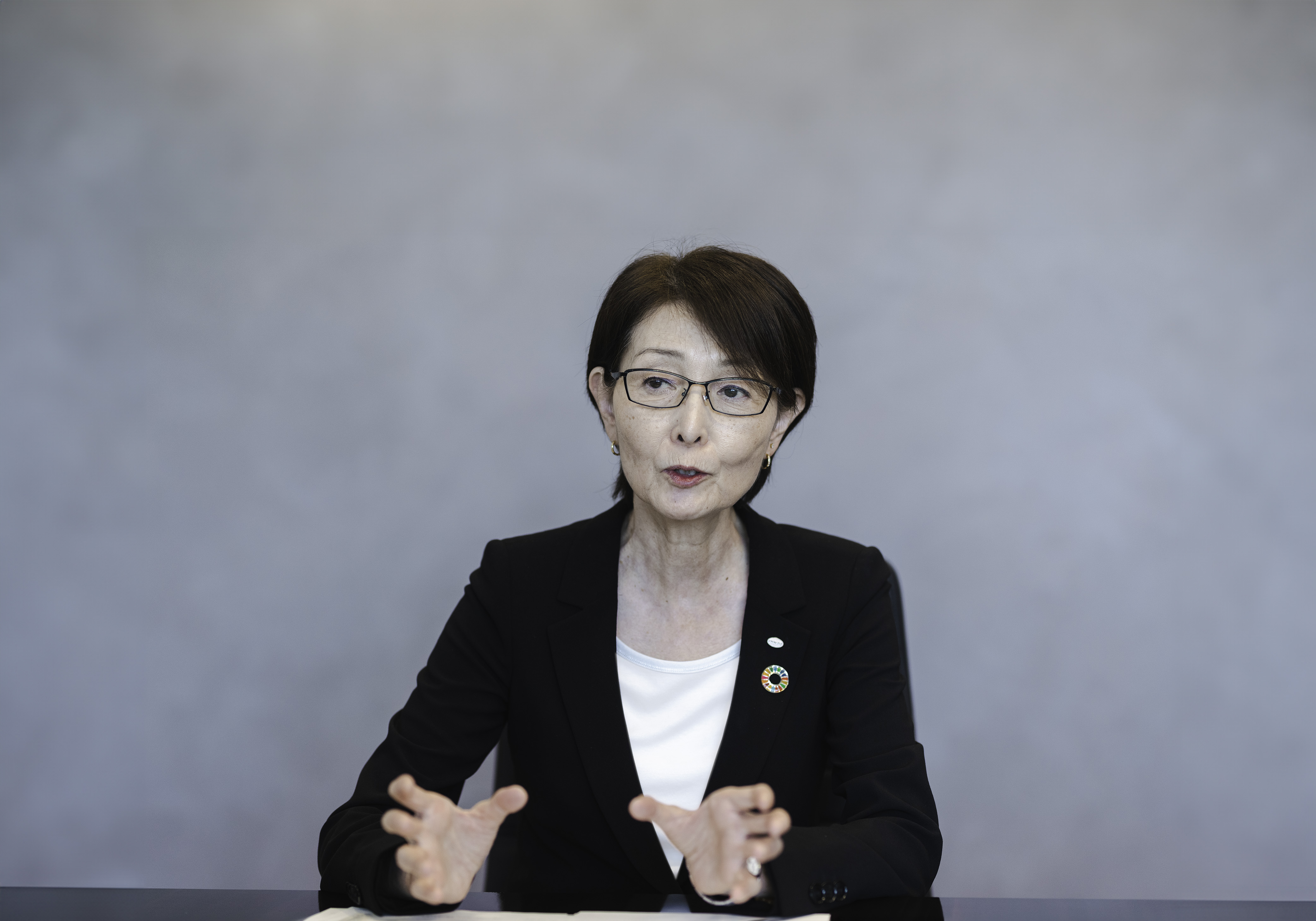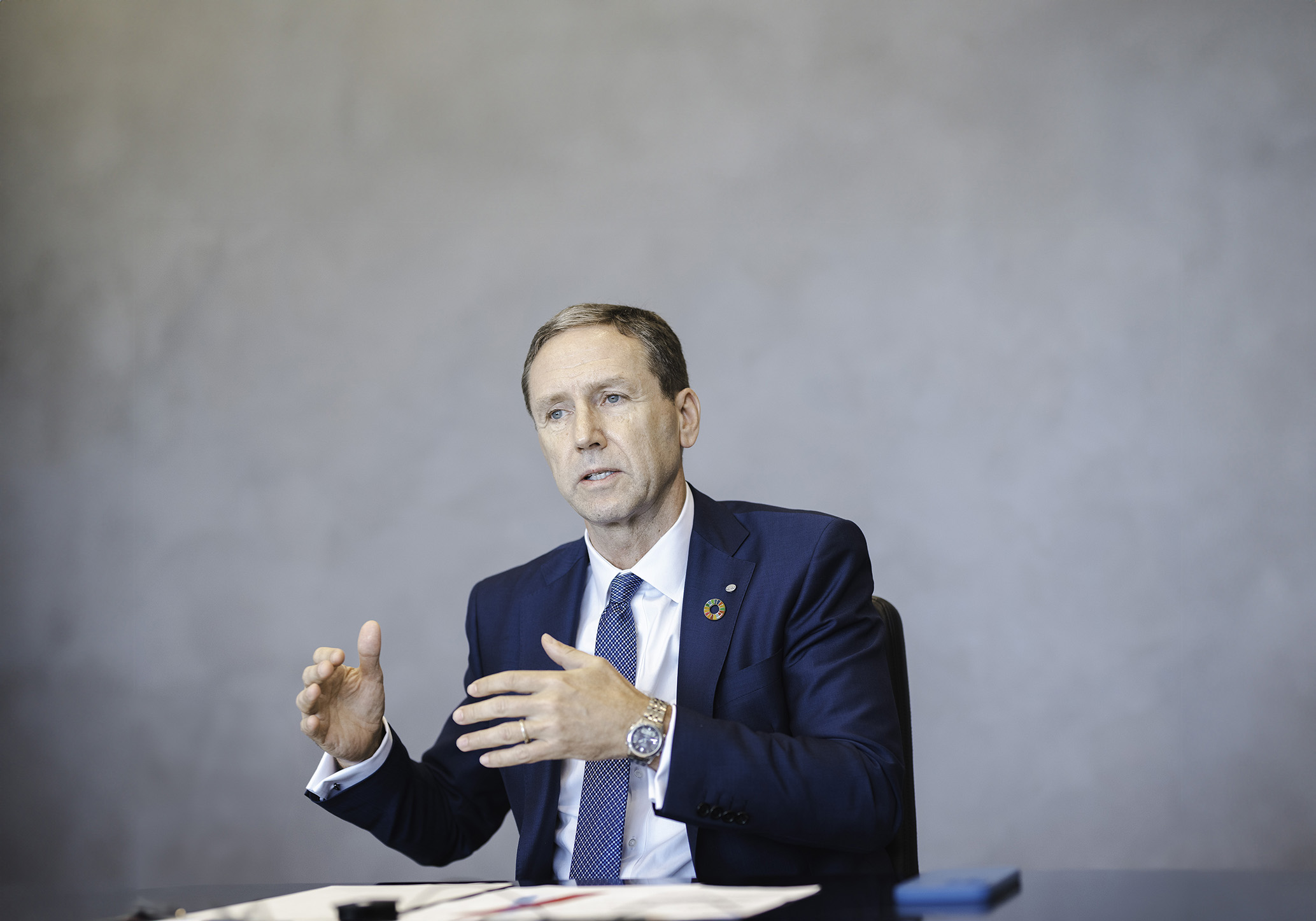Dialogue with the Outside Board Members
Surviving in a Changing Business Environment by Developing Management and Corporate Governance
Having formulated “Reborn21” and the Mid-term Policy for 2025, DENSO transitioned to a new management system in June 2023. We invited our three outside Board members, who were deeply involved in selecting the new president & COO, to discuss candidly the significance of the new management system as well as the progress made and the tasks that lie ahead regarding DENSO’s corporate governance and sustainability management.
-
Joseph P. Schmelzeis, Jr.
After serving in such positions as corporate director at SEGA SAMMY HOLDINGS INC. and senior advisor to the ambassador at the U.S. Embassy in Tokyo, Mr. Schmelzeis currently works as executive manager at Cedarfield Godo Kaisha. He was appointed as outside Board member of DENSO in 2022.
-
Shigeki Kushida
Mr. Kushida has been serving as an outside Board member at the Company since 2019. He also serves as president and representative executive officer at Japan Securities Finance Co., Ltd., and has experience working at the Bank of Japan.
-
Yuko Mitsuya
Ms. Mitsuya has been serving as an outside Board member at the Company since 2019. She also serves as representative director of SORA Corporation and has a long history in the sports world.
Balanced Responses to a Changing Environment and Medium- to Long-term Tasks
Kushida Although the past several years have seen the emergence of the COVID-19 pandemic and a range of other issues, DENSO’s business management has minimized their impact on businesses and governance. During this period, the Board of Directors has placed more emphasis on dis-cussing medium- to long-term strategies such as CO2 emissions reduction and vehicle electrification. This long-term approach is characteristic of the automotive industry, where model changes take several years to accomplish.
I believe that the strategies set out in the Long-term Policy for 2030 and the Mid-term Policy for 2025 are appropriate overall.
Schmelzeis Supply disruptions accompanying the COVID-19 pandemic and recent geopolitical tensions have again highlighted the negative effects of dependence on specific countries and regions. DENSO’s investment strategy shows the senior management team’s awareness of the urgent need to ensure supply chain resilience.
Mitsuya The quality issues that coincided with the COVID-19 pandemic were a major event that put DENSO’s real worth to the test. In dealing with a situation that shook the foundations of business management, president & CEO at the time Koji Arima (currently chairman & CEO and representative member of the Board) showed superb leadership. As well as swiftly launching the DENSO Revolution Plan “Reborn21,” the senior management team demonstrated its commitment to reform through the leadership of the chief corporate revolution officer. In addition, a series of rigorous in-house discussions were held with the aim of creating a more open organization. The dramatically improved quality and risk management that resulted from these initiatives was the driving force behind subsequent Companywide efforts that overcame a global semiconductor shortage to achieve record profits in fiscal 2023.
DENSO is investing a significant amount of money in R&D in the connected, autonomous, shared & service, and electric (CASE) vehicles field. The difficulty here is that the funds for such R&D are being generated through the earnings from internal combustion engine products, a field that is projected to shrink. I feel that DENSO’s approach of steadily shifting to growth fields while being attentive to the feelings of employees engaged in shrinking businesses is extremely well-balanced.
Management That Values People
Kushida Among the many aspects of human capital-focused management, heightening employee engagement is one of the most important considerations. To increase the number of employees who take steps based on owner-ship of management issues and are sympathetic to the Company’s value creation approach, a willingness to actively convey management thinking to employees is essential. DENSO’s senior management team takes considerable pains to ensure that employees are kept fully informed, with “Reborn21” being a good example of such efforts.
Another important factor related to employee engagement is enhancement of workplace environments. In this regard, even though the COVID-19 pandemic has been contained, DENSO is continuing to promote telecommuting and various other workstyles. We believe that, over time, such initiatives will enable the realization of human capital-focused management.
Schmelzeis The expertise of personnel is the key to port-folio transformation. Fully aware of this, the executive side is advancing appropriate measures, which include reskilling engineers and stepping up mid-career hiring.
In new business fields, DENSO is likely to face fierce com-petition from global IT giants. The advantages they lack but which DENSO enjoys are a legacy of continuous support for safe, reliable mobility as well as the trust and reputation that have been established over many years not only in the Toyota Group but with various other automakers and industries in Japan and overseas. I believe these strengths provide the foundations for collaboration with external parties and cannot be easily replicated by other companies.
Mitsuya As well as the details of numerical trends, discussions on human resources are the most important focus at Board meetings. In our roles as outside Board members, we are actively encouraging transformation of the Company’s business portfolio. Meanwhile, the executive side is de-emphasizing and discontinuing internal combustion engine products in a way that maximizes the value that the shrinking businesses create for society as a whole going forward. The executive side is providing in-depth explanations to employees and customers affected by the downsizing of existing businesses. Such efforts are a testament to the senior management team’s attitude, which has contributed to high levels of loyalty and compliance awareness among DENSO employees.
Schmelzeis From an American perspective, DENSO’s efforts to take into consideration the impact on customers when transforming its business portfolio is slightly surprising. Nonetheless, I am sure the Company’s attitude has been instrumental in sustaining the DENSO brand.
New Leadership for Change under “Team Hayashi”
Kushida In June 2023, Koji Arima, who served as president for eight years, assumed the position of chairman & CEO, while Shinnosuke Hayashi became president & COO. In preparation for this change of presidents, we established a succession plan more than three years ago and selected the next president based on a series of deliberations at the Executive Nomination and Remuneration Council. The council’s five members included then-president & CEO Koji Arima and three outside Board members, who constituted a majority. As chair, I focused on ensuring that the most suitable person for the position of president was selected based on fair criteria and an appropriate process. Specifically, we conducted an evaluation based on the attributes required of the senior management team’s leader, which comprised the five personality traits of integrity, reliability, resilience, accountability, and positivity and the three skills of decisiveness, strategy formulation capabilities, and leadership. Then, we interviewed candidates and discussed our impressions of them with reference to in-house opinions. As a result, we decided to appoint Shinnosuke Hayashi as the new leader.
The strengths of the new president include his expertise with respect to software and digital technologies. I look
forward to seeing him combine this competence with his knowledge of in-house hardware and mechanical parts to build a new corporate profile for DENSO. As he has both firm convictions and the ability to unite and mobilize the organization, I think the appointment was excellent.
Mitsuya The establishment of the succession plan resulted from the strong desire of the former president, Koji Arima, to foster his own successor. The selection process could hardly have been more methodical and procedurally correct.
The new appointments have formed “Team Hayashi,” which is led by the new president, Shinnosuke Hayashi, and supported by the chairman, Koji Arima, and the executive vice president, Yasushi Matsui. When a huge company like DENSO seeks business transformation on a global scale, appointing a leader who has insight into the growth fields that are the focus of such transformation and enabling everyone to support him makes sense. Through the selection process, I have come to know many of DENSO’s talented personnel and furthered my understanding of the Company.
Schmelzeis I have very high expectations of the new senior management team. First of all, the new president has a wealth of experience in developing automotive software and is someone who can take the next step forward with confidence. Moreover, he has adequate support.
In particular, the retention of Koji Arima through his appointment as chairman is a big plus for the Company’s business management. In the course of a long career, he has become thoroughly conversant with each business field and acquired a wealth of overseas experience. Moreover, he has well established relationships with the senior management teams of automakers and holds a key industry position as chairman of the Japan Auto Parts Industries Association. He will be able to pass on lessons learned to the new president by sharing with him the successes and failures of decisions made during his eight-year tenure as president.
In addition, Yasushi Matsui, who is the chief financial officer as well as the executive vice president, combines an aptitude for figures with an understanding of how to achieve a balance among businesses that maximizes profits. These attributes make him ideally suited to managing and transforming DENSO’s business portfolio. By working together, these three individuals are sure to form a powerful team.
Mitsuya The new president is approachable and has the magnanimity to accept whatever is said to him. With the addition of supplementary explanations from financial expert Yasushi Matsui, I think discussions at meetings of the Board of Directors have become more readily understandable and lively.
Kushida The new president is able both to take on board feedback from junior employees and see things on a large scale and from a broad perspective. This ability probably stems from his inherent openness and people skills as well as his experience in integrating multiple business divisions to align them with electronics technologies. I also think the relationships between the three members of the new senior management team are ideal.
Toward More Effective Operation of Board Meetings
Kushida As it aims to separate management and execution, DENSO’s governance policy is consistent with the spirit of Japan’s Corporate Governance Code. Although DENSO has a Company with an Audit & Supervisory Board institutional design, the Company’s establishment of the Executive Nomination and Remuneration Council and other governance measures has reached a level that makes DENSO comparable to a Company with a Nominating Committee institutional design. Another step forward is the clear separation of roles that has been achieved by appointing a chairman who chairs the Board of Directors and a president who leads the executive side. That said, I think we need further innovations to narrow down the number of agenda items discussed at Board meetings.
Given the volatility of the current environment, we would like to devote more time to discussions on big-picture strategies that focus on the business portfolio and overall market trends, but doing so can be challenging because the agenda items that a Board resolution can approve are stipulated by the Companies Act of Japan. At present, time tends to be taken up with approving resolutions on small individual agenda items. On the other hand, when formulating major medium- to long-term strategies, bottom-up discussions tend to be held within the Company first, resulting in drafts that are close to completion. This approach may be due to an open corporate culture. However, I think the Board should begin discussions at an earlier stage, communicate overall strategy to divisions, and then receive feed-back from them.
Schmelzeis I have only been participating in the meetings of DENSO’s Board for a year. Looking back over the past year, while the scope of individual agenda items has certainly varied, I feel that we have been able to have discussions about overall strategies. Our discussions have been unreserved and very lively. By maintaining an external view-point and calling attention to issues as appropriate, we help the Board function well and fulfill our roles as outside Board members. Under the new senior management team, such positive features of Board meetings are likely to become even more pronounced.
Personally, I hope that we can involve overseas personnel in discussions to a greater extent. Feedback from frontline operations will invigorate Board discussions and further heighten employee morale.
Mitsuya The Board’s consistently in-depth follow-ups with respect to past investments deserve praise.
However, with a view to better operation of Board meetings, I would like to see more effective utilization of prior briefings. Using up the limited time available for Board meetings with explanations of the complicated backgrounds of individual agenda items is a waste of time. Devising ways to separate prior briefings from Board meetings would enable broader-based discussions at the Board meetings.
Toward Integration of Financial and Non-Financial Goals
Kushida In May 2022, following resolutions approved by the Executive Nomination and Remuneration Council and the Board of Directors, we fundamentally reformed the officer compensation system. The reform has two main features. The first is an increase in performance-linked compensation as a percentage of total compensation from 40% to 50% for general officers and to 60% for the president. The second feature is an increase in the key performance indicators (KPIs) used to calculate performance-linked compensation. In addition to the existing consolidated operating profit KPI, we have included return on invested capital (ROIC) and sustainability score as KPIs. These additions reflect the senior management team’s greater focus on capital efficiency and environmental, social, and governance (ESG) factors.
Sustainability score is arrived at by evaluating the achievement of workplace safety and quality, environmental tasks, employee engagement, and diversity and inclusion. Currently, sustainability score accounts for 10% of performance-linked compensation, but we envision an increase in this percentage.
Mitsuya Only pursuing financial efficiency can lead to sacrifices in relation to safety and other matters. In this regard, however, the chief financial officer, Yasushi Matsui, is fully aware of the importance of non-financial matters, which is reassuring. I believe that the concept of integrated value creation is highly compatible with DENSO’s management style as it emphasizes people. Accordingly, we have established a sustainability score KPI that is consistent with our belief in the importance of integrated value creation.
Schmelzeis While linking the KPIs to officer compensation is important, business management must also be premised on the numerical analysis and visualization of issues. For example, the concept of carbon pricing entails managing CO2 emissions as if they were financial receipts and expenditures. Analysis of the Company’s current situation through a large-scale survey of diversity and employee engagement would provide the starting point for a range of initiatives.
Kushida The idea that corporate management which is focused on environmental and social issues will positively impact financial indicators in the long term may, at the moment, be just that—an idea. Nevertheless, the fact that many people are taking action based on such a belief is significant and provides a good opportunity to think about services and businesses from a long-term perspective. In fact, other countries are achieving concrete results through ESG initiatives, particularly in the field of diversity. DENSO’s introduction of KPIs that link non-financial and financial performance is likely to grow in significance, as such linkage is an area where Japanese companies are notably lagging behind. I hope the new KPIs continue to be adjusted as needed and carefully developed by DENSO.











